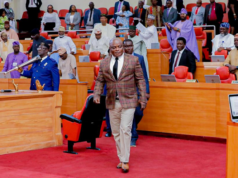
The Igbos are one of Nigeria’s three main ethnic groups in a country of about 200 million. Based in Southeast Nigeria, this industrious and acephalous group has attracted a lot of attention from research in recent years. Most of it has focused on the success of Igbos in artisanal enterprise and informal training. Now their apprenticeship system has become a talking point.
Most of the research on the Igbos’ success in business has been through the traditional cultural lenses of anthropology and sociology. My co-authors and I have sought to move beyond these cultural frames to a business and management lens— notably entrepreneurship.
I have been studying Igbo entrepreneurship since 2008. In my earlier article, my co-authors and I drew the illustrative case of Nnewi culture. This is an Igbo enclave in Southeastern Nigeria renowned for its high incidence of productive entrepreneurship. It is noted for its automates and manufacturing businesses, which at the time of our research had only received limited research attention.
Almost a decade later, I co-authored a paper which highlighted that the “informal apprenticeship system provides entrepreneurial learning that prepares the younger generation to take to business as a way of life.”
The role of family affinity and networks in business has been observed across geographies. The use of family networks this way makes significant contributions to the economic growth of nations.
To understand better the effect of these family networks, my co-authors and I interviewed 25 Igbo entrepreneurs to find out what constituted the catalyst for the business model.
About the study
Our research identifies the key variables associated with trans-generational business legacies and succession. The Igbos, like most other indigenous groups, believe in maintaining a legacy of not just their language but other values, customs and norms. In particular, for the Igbos, business continuity seems paramount as a means to ensuring that there are trans-generational business legacies.
The study also highlighted salient Igbo cultural and community nuances. These include the role of Di-okpara (first son), Umunna (sons of the land), Ikwu (members of a kindred) and Umuada (daughters of the land). These insights inform a contribution to the discourse of ethnic or indigenous entrepreneurship, which has both theoretical and policy implications.
We then developed four themes that serve as the points from which trans-generational entrepreneurship is nurtured among the Igbo. These are:
- “Nwaboi” (informal volunteering);
- the role of first son (di-okpara), which is closely linked to “afamu-efuna”;
- the independent and individualist, but yet communal, that is, “acephalous” nature of the Igbos (“Igbo enwe Eze” – Igbos have no king); and
- the entrepreneurship collaborative and cultural initiative – the role of kindred (Umunna).
First, the Nwaboi apprenticeship system assumes two forms, “Imu-Oru Aka” (learning a craft or skill) and “Imu-Ahia” (learning to trade) across all kinds of trading to various crafts and skills.
Second, Igbo businesses survive across generations through the identification and the nurturing of sons who can take over the business. If the first son shows no interest, any other male in the family with potential is trained to take over the business. Indeed, the notion of “Di-okpara” highlights the significance of a male child (normally the first son) to the legacy of the family and any succession plans. It is also linked to the notion “afamu-efuna”, which guarantees the lineage among the Igbos.
Third, there is the moderating role of the Umunna (sons of the land), Umuada (daughters of the land) and Ikwu (members of a kindred). These are the arbiters of family or societal disputes. The decisions of the Umunna are binding on members of the clan. In addition, where family business conflict arises, the elders of the kindred step in to settle the dispute. By resolving disputes internally, the mechanisms help avoid lengthy court processes which are often disruptive to the running of businesses. This makes the role of Umunna very potent.
Just like Umunna, there is also the “Umuada” (Umu means people) of first daughters (Ada). This is an association of influential indigenous women. The group goes beyond the first daughters whose ancestry is traced to a village or town. The Umuada represents the interests of women and serves as a bridge between women and men.
In some cases, the Umuada also serve as checks on the abuse of power by the council of elders. Umuada can, as result of these powers, intercede in any disputes related to business practices. Besides, women sometimes also engage in these business activities.
Generally speaking, arbiters such as Umunna and Umuada have tended to help shape new norms and beliefs. On the other hand, other Igbo structures help facilitate the creation of more effective business processes. These include better financial frameworks. An example is Afam efuna, an equitable “nwaboi” system overseen to some extent by custodians such as Ikwu, Umunna and Umuada. These Igbo structures therefore enable the development of new markets and cultural innovation. They also enable Igbos to maintain trans-generational business legacies and inter-generational succession.
The Igbo culture of entrepreneurship can be traced back to the slave trade in the 15th century. By the 1800s about 320,000 Igbos had been sold to slave traders both within and outside of their communities at Bonny, 50,000 at Calabar and Elem Kalabari.
This process continued until the abolition of slave trade in the 1900s. Unlike most African communities, slaves from the Igbo ethnic group were exposed to entrepreneurship by their owners, including members of their own tribe who traded commodities like spices, sugar, tobacco, cotton for export to the Americas, Europe and Asia. Long before Europeans arrived, Igbos enslaved other Igbos as punishment for crimes, for the payment of debts, and as prisoners of war. The practice differed from slavery in the Americas.
Igbos built on this, venturing into various forms of entrepreneurship during the pre-colonial era. Colonisation found the Igbos already leading craftsmen, traders, merchants and cottage industrialists. They have maintained this culture of entrepreneurship through the structures and mechanisms described above.
Policy implications
The findings from Igbo ethnic entrepreneurship studies cannot necessarily be generalized for all other ethnicities. They also provide realistic and current examples of how African entrepreneurship is embedded in unique cultural phenomena. However, each of the elements of the Igbo entrepreneurial spirit and culture raises different issues, in particular how societies can sustain entrepreneurship across generations.
The lessons from the success of Igbo trans-generational entrepreneurship can certainly be adapted to other socio-cultural settings. American journalist and author Robert Neuwirth hinted at this while talking about the Igbo apprenticeship system.
Taking a cue from the title of the book by the celebrated Chinua Achebe, one of the greatest poets of “Igbo” ancestry, scholars cannot let “Things Fall Apart” in this quest to understand and act upon the dynamics and potential of ethnic groups and their contribution to the global economy.
The Igbo entrepreneurship model has demonstrated, time and again, how to navigate both ethnic and gender discrimination in mainstream society. This has obvious managerial, research and policy implications.
Source: QZ







